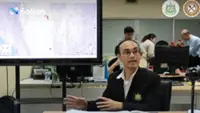
Three activists enter a venue in Fairmont Hotel in Jakarta where a closed-door meeting between lawmakers and the government was taking place to revise the Indonesian Military (TNI) Law. - Kompas via The Jakarta Post/ANN
JAKARTA: Lawmakers rushed to cross a democratic "red line” this week by insisting on revising the Indonesian Military (TNI) Law, critics contend, despite attempts to appease public fears of the return to an authoritarian past.
The House of Representatives and the government are currently debating ways to expand the country’s vast military under President Prabowo Subianto, including by allowing more civilian roles for military personnel without the requirement for them to retire, which was a key reform after the fall of Suharto’s New Order regime.
The House is scrambling to pass the bill, which in turn further entrenches the public’s negative sentiment following a weekend fiasco that saw protesting activists get ejected from secret marathon talks.
The latest draft of the bill, according to House Deputy Speaker Sufmi Dasco Ahmad of Prabowo’s own Gerindra Party, will revise three provisions in the 2004 TNI Law. The most contentious of those provisions seeks to increase the number of state institutions to which military officers can be appointed without resigning or retiring from ten to 16.
The new institutions are the Maritime Affairs and Fisheries Ministry, the Attorney General’s Office, the National Disaster Mitigation Agency (BNPB), the National Counterterrorism Agency (BNPT), the Indonesian Maritime Security Agency (Bakamla) and the National Agency for Border Management (BNPP).
Around 180 activists and scholars along with 190 civil society organisations signed a petition on Monday (March 17) to reject the revision. "It will only restore the TNI back to its ‘dual-function’ system. This is not in accordance with the principle of professionalism and risks creating more problems,” activist Maria Sumarsih said when reading out the petition. Maria is the mother of a student activist who was killed in 1998 in the Semanggi I shooting tragedy.
Amnesty International Indonesia executive director Usman Hamid, one of the petition’s signatories, said that policymakers are “crossing a red line” in the nation’s democracy by giving TNI more posts in government.
“The TNI’s main task is defence. Assigning them to any other task will make the military weaker at the cost of the public. [The bill] is just a way to sidestep the overabundance of flag officers in the TNI by giving them civilian jobs,” Usman said.
He also raised concerns of impunity among officers when they take up civilian posts, particularly since lawmakers still have yet to revise the 1997 Military Tribunal Law to ensure that soldiers can be tried for crimes in civilian courts. “That’s the second red line. There are no judicial ethics to ensure accountability [without revising the Military Tribunal Law],” Usman said.
Military expert Al Araf of rights group Imparsial said “there is no urgency” for revising the TNI Law. “People view the revision as opening a Pandora’s box that can escalate into the return of militarism, which will adversely impact the merit system within [the government]. Lawmakers need to prioritise attending to these criticisms instead,” he said on Sunday.
When months of student demonstrations finally toppled Suharto’s 31-year-long rule in 1998, the reform era rolled around with high hopes for sending the military back to the barracks, establishing the antigraft agency, as well as fostering a strong press system.
Just over a quarter of a century since then, the Corruption Eradication Commission (KPK) has been systematically defanged following the 2019 controversial amendment to the KPK Law, and with the TNI Law next on the chopping block, the press could soon become the only remnant of the reform era left-standing.
Efforts to revise the military law actually surfaced last year during the administration of former president Joko “Jokowi” Widodo but stalled after strong public rejection. They were restarted in February after the House approved a request from Prabowo to put the bill on this year’s list of priority legislation.
The President, however, remained silent when asked by reporters on Monday for his thoughts on the growing public rejection toward the TNI Law revision. Concerns of military overreach have mounted since Prabowo assumed office five months ago.
The former Army general has regularly looked to the TNI to help carry out his programmes and allowed several active military officers to be appointed to civilian posts, despite violating the prevailing law.
An example was the appointment of Maj. Gen. Irham Waroihan as the Forestry Ministry’s inspectorate general.
House deputy speaker Dasco told a press briefing on Monday that lawmakers were aware of the growing concerns regarding the planned revisions but said that they were misguided because they were based on outdated versions of the draft bill.
“There are growing [concerns on the return of] dwifungsi [dual-function]. But once [the public] sees the provisions we are actually discussing, it’s clear [that’s not the case]. Us, the lawmakers, also want to keep civilian supremacy,” Dasco said.
Chairman of Commission I overseeing defense and security Utut Adianto of the Indonesian Democratic Party of Struggle (PDI-P) said that lawmakers “had invited” members of the public in drafting the bill. He was responding to accusations of a rushed process as well as a lack of transparency and public participation, particularly after lawmakers and the government convened over the weekend at a high-end hotel in Jakarta for closed-door deliberations that were marked by the forced removal of protesters.
The Commission I is slated to decide on Tuesday whether or not to bring the revision to the nearest plenary session that is scheduled for Thursday, during which lawmakers can decide on the passing of the bill into law before the recess. - The Jakarta Post/ANN










































